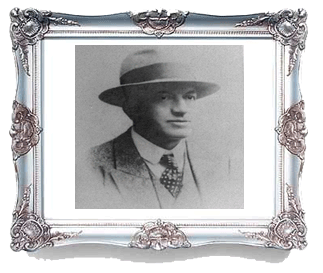Ernest Howard Armstrong Elkington
After arriving in Kenya Ernest Howard
settled at his cousin James’ small farm in Kericho near a place known as
Sixty-Four. They were selling horses and were in the process of importing
Masara Hounds from England. However, this enterprise was thwarted due to various
natural disasters and devaluation of the currency in British East Africa.
It was during this period he met and married a young Kenyan girl called
Elizabeth and also bought a farm in Kamiti on the outskirts of Nairobi.
The marriage lasted until his death in 1928.
During the First World War Ernest Howard was commissioned to join the E.Africa
Vet Corps. He participated as Trans E.A.S. Lieut. 1914-1919.
Ernest
Howard was involved in a motor cycle accident and seriously injured his leg.
He was hospitalized for a short period at Nairobi Hospital before his death on
19th
December 1928.
In
February 1929 Ernest Howard’s eldest sister Nora came to Kenya to meet his
familly and also put a headstone on his grave.
|
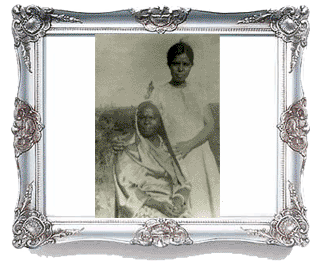
|
 |
|
Mrs. Elizabeth Rahab Elkington and
eldest daughter Irene |
The 4 sons of Ernest Howard Armstrong
Elkington
John, Jimmy, Richard and Scott.
|

. Eldest daughter Irene | 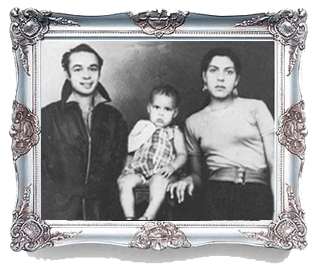
. Ernest Howard's youngest son John with wife and son |
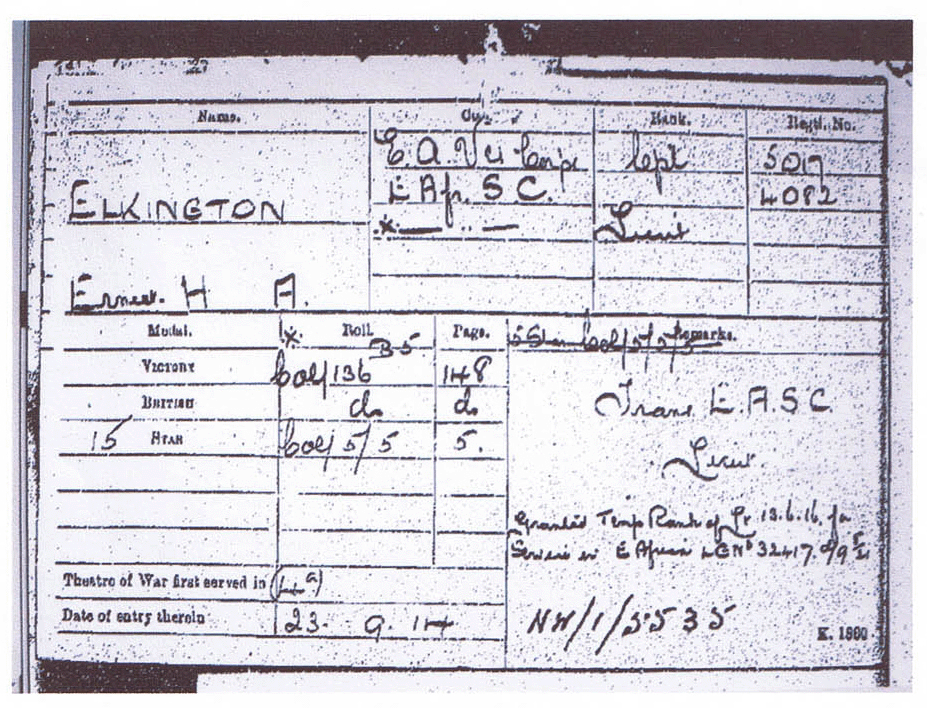
Date
1914-1920
Catalogue WO 372/8
Reference
Dept Records
created or inherited by the War Office, Armed Forces, Judge Advocate
General, and related bodies
Series War
Office: Service Medal and Award Rolls Index, First World War
Piece Denham
W-Everitt H
First World War – British East Africa
Ernest Howard Armstrong Elkington in 1914 at the age 43 years old was commissioned to join the E. African Corps. He participated as Trans East African Supply Corps/East African Vet Corps. The doctor for this department was Dr. Burkitt, the recruiting officer was Dave Genower and Sir Henry Belfield was in charge of the Colonial Office. The Nairobi Racecourse was hurriedly changed to the Transport Depot and the Head Quarters of the Carrier Corps.
The Carrier Corps/Transport Corps is where thousands of porters perished as they bore the vital supplies to the front where there were no suitable roads for transport. When packed mules and horses began to die in droves, it was the Carrier Corps which replaced them.
In 1915 the situation got worse as those who worked for the Animal Transport now had to deal with enormous number of dying mules whose average of work age was 6 weeks.
The men were desperately short of food and African Porters had to carry on in the most appalling conditions, night or day, wet or fine, food or no food and it is stated approximately 44,000 men died on active service mostly from dysentery, malaria and exposure.
The Carrier Corps although suffering badly continued to work as without their essential services the army could not move a yard and it was felt that if any particular unit could be said to have won the war against the German East Africa, it was this one, who with a minimum of food and clothing were called upon to do the well near impossible and were in the beck and call of every unit wherever other forms of transport failed, the porters were sent for especially at this period where the animals were seriously depleted.
At this period his Cousin James Llewellyn Meredith Elkington had opened his Masara House where his wife Rachel catered for the wounded officers whilst he and his daughter Margaret worked at the Census Office first in Nairobi then Mombasa.
Lady Delemare was made Mayor of Nairobi.
The Carrier Corps Transport Depot was re-named Kareioko by the local Kenyans.
In 1919 Nairobi was declared to be a municipality
Elizabeth Rahab Elkington - wife of
Ernest Howard Armstrong Elkington.
After the marriage in 1913 Elizabeth and Ernest Howard Armstrong Elkington raised their six children at their farm in Kamiti.
Bogus Trustees confiscated their farm at his death on 19th December 1928.
When Ernest`s sister Norah came to Kenya to attend the funeral she made some financial arrangements. Elizabeth received limited assistance for the upbringing of her six children from the Elkington Trust Fund, through the Christian Missionary Society Mission (CMS). All assistance and contact with the Elkingtons in Britain stopped at the untimely death of Norah in 1943.
Elizabeth Rahab Elkington died in the
early 1950´s after a long illness.
Ernest and Elizabeth Elkington’s
children
Irene Elkington
Irene was the eldest of Ernest Howard’s and Elizabeth’s children. She was
born in 1914 and eventually became the custodian of the family. She
was intelligent and hard-working with strict Victorian values which gave her the
characteristic that of a strict matron.
Irene walked miles to visit her sick father in Nairobi Hospital, after his
motor-cycle accident which left him an amputee. The distance from their farm in
Kamiti to the Nairobi Hospital was long and tedious. Hence Irene was the last
person to have contact with her
father before his death on 19th December 1928.
Most of Irene's career was in institutional management. Her last assignment was
as a cateress for the Kenya Breweries. She was highly respected member of
the community and was one of the first mixed-race women to build a stone house.
Irene and her cousin Margaret Meredith
Elkington were on friendly terms and met quite frequently.
Gladys Elkington
Gladys was the second born of the
children.
Gladys was an attractive woman who
married at a very young age. She raised seven children but also managed to
hold the reigns on her younger brother.
She liked cooking, sewing and telling
stories.
Jimmy Elkington 1917-1979
Jimmy was the eldest son of Ernest Howard Armstrong and his wife Elizabeth.
He was a sensitive young man who did not
enjoy hunting, rather was academically orientated and had a flair for cooking.
Jimmy attended the Christian Missionary Society School where he attained an
accountancy certificate which enabled him to find a good paying employment with
the District Commissioner’s Office in Machakos in the early 40's. During the war
Jimmy worked in the Administration Department. When the war was over and he was
on his way home to his family the vehicle he was
travelling in over-turned and he sustained severe
injuries to his head and became an invalid for the rest of his life.
He died in 1979 leaving five children.
Richard Elkington
Richard Elkington was the 4th child of Ernest Howard Armstrong Elkington and his
wife Elizabeth Rahab. Richard was born 1920 in Kamiti about 8 miles north of
Nairobi.
His great hobby as a child was following his father Ernest Howard on the hunting
trips.
With his brothers and sisters he attended the Church Missionary Society School.
At an early age he was employed at the
vehicle maintenance department for the then British Army.
He married his bride Rosemary in 1944 and they raised 8 children
four sons and 4 daughters.
Richard had his own transport business
in Nairobi and he had several employees such as drivers and mechanics.
He died in October 1955 after a short
illness.
Scott Elkington
Scott was the third son of Ernest Howard Armstrong and Elizabeth
Elkington. Like Jimmy, Scott attended the Christian Missionary Society and
attained an accountancy certificate enabling him to pick and choose work.
He was a charmer and a natural entertainer who enjoyed playing the guitar and
singing to lady fans.
Scott married Mary Ali Khan and together they raised 9 children. His wife
died in Eldoret, where they spent most of their lives, but he migrated and died
in England.
John Elkington 1926 -
John is the last born child. He was only a baby when his father died.
Due to his father's death the farm was sold and they were forced to move
to rented accommodation around Nairobi until they finally settled in Pangani,
Nairobi.
John went to a Roman Catholic school run by the Loreto Convent Sisters in the
City Center of Nairobi. He left school at an early age and took up
motor-vehicle mechanic's work.
He married Anne Butler and they have a son called Robert. John and his
family now live in Northern Ireland.
Legal History: Of British Colonial Laws in Kenya
European colonial interest in Kenya began with Portuguese efforts to
establish safe ports in the area of Mombasa from 1498.
The Omanis captured Mombasa in 1696. British interests in the East
African region
in the mid to late 19th century led to the formation of the British East Africa
Company. In 1895, within a decade of the founding of the East Africa
Company, the area from the coast to the Rift Valley was declared the
British East Africa Protectorate.
Kenya gained independence in June 1963. Under the British protectorate, Kenya
had
parallel legal systems with African courts applying customary law, and appeals
lying
with the African Appeal Court, then with the District Officer and then a Court
of Review.
Muslim personal law was applied by Courts of Liwalis, Mudirs and Kadhis,
with appeals lying with the Supreme Court (renamed the High Court after
independence).
The process of integrating the judicial system began in
1962 when powers of administrative officers to review African Courts'
proceedings were transferred to magistrates. The process was completed by
the passage of two acts in 1967. The Magistrates' Courts Act 1967
abolished African Courts and the Court of Review and established District
and Resident Magistrate's Courts and a High Court. The Kadhis' Courts Act
1967 established six Kadhis' Courts for the application of Muslim personal
status law.
80th DEATH’S ANNIVERSARY 1871-1928
In Loving Remembrance of our beloved Grand Father Ernest Howard Armstrong Elkington`s 80th Death Anniversary
Grand Dad, unfortunately your tragic and untimely death of 19th December 1928 robbed the world of a very great Gentleman, a most loving husband, father and Grandfather.
Your great courage against the prejudice of the 20th century against mix-marriages did not deter you from holding your loving family together, against all odds, even in death your spirit has always been with us.
May God Rest your Soul in Eternal Peace until we meet!
Obituary John Robert Elkington
The death has occurred of John Robert Elkington on 26 December 2008.
John Elkington was 82 years old, died after long illness in Ireland leaving behind a
Wife, Son, two Grand Children and a Great Grand Son.
Uncle “Tex” Your Happy and Cheerful Spirit will be greatly missed by your Sisters-in-laws, Nephews , Nieces and other Relatives
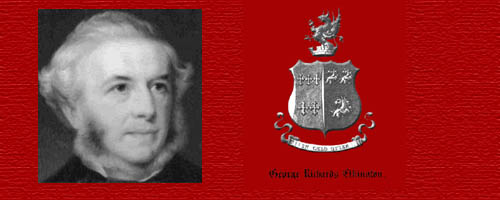
George Richards Elkington 1801-1865
(I have noticed errors concerning our George Richards Elkington and Mary Auster Balleny`s Family Tree on the internet)
Correct Historical Information of George Richards Elkington & Mary Auster Balleny Elkington 1858, is as follows:-
George Richards Elkington & Mary Auster Balleny Elkington had 5 Sons and I Daughter only:- Frederick, Alfred John, James Balleny, Howard and Hyla. A daughter called Emma Elizabeth who married Alspeth Smith.
G. R. Elkington`s 2nd wife was called Margaret Morgan (no issue) 1872*
The Elkington & Co was founded by George Richards Elkington 1801-1865 with his cousin Henry Elkington (who married his sister Emma they had one son only who died at 5 years old) and Josiah Mason.
After new research on various books and internet information I have concluded that George Richards Elkington is not related whatsoever to a person called Joseph Elkington who invented the famous land drainage system. Similarly, a person called Thomas (who strangely had several children with similar names as Howard Elkington & Annie Elizabeth Armstrong children has no connection whatsoever, with the George Richards Elkington family tree.
Ernest Howard Armstrong Elkington was an Engineer. He was not a Veterinary Surgeon.
It was Dr Roland Burkett who was a private practitioner/surgeon during WWI who treated both patients and horses for malaria in Nairobi/Kenya.
Ernest Howard Armstrong Elkington lived in British East Africa from 1906 until his death in 1928.
He was never a resident of German East Africa nor died in GEA in 1919 as implied by some websites

The Sultan of Zanzibar visiting Elkington`s Factory Birmingham 1875
The Elkington cousins Ernest Howard Armstrong Elkington and James Llewellyn Meredith Elkington, the heirs of the world famous Elkington & Co. (Electro-plating Silver Company) and respected pioneers, bought lots of land in Kenya From 1905 until their untimely deaths in 1925 and 1928 respectively. Elspeth Huxley played down their fortune and social standing by not mentioning Ernest Howard Armstrong Elkington at all whilst the few times she writes about James (Jim) she only wrote negative comments. See new recommended reference books below.
Howard Elkington`s eldest daughter was called Norah Anita Elizabeth
Howard Elkington and his wife Annie Elizabeth Elkington had no children called Gladys Olga, Alec Howard or Violet Eveleen as stated in some websites.
The Elkington’s in Kenya`s official and only authentic Executor and Trustee was their cousin GERARD BARTLEET ELKINGTON (Frederick Elkington’s son (1826 – 1905) and no one else!
I have removed the link of Elkington marriages as I noticed it is now covering all persons called Elkington and not only for the George Richards Elkington’s Family Tree.
Also we have no persons called Hassan, Hussein or Hussain on George Richards Elkington’s Family Tree whatsoever.
References books
* Europeans in British Administered East Africa by Stephen J. North
* Pioneers Scrap Book edited by Elspeth Huxley and Arnold Curtis
* Biography of Elspeth Huxley by C.S. Nicholls.
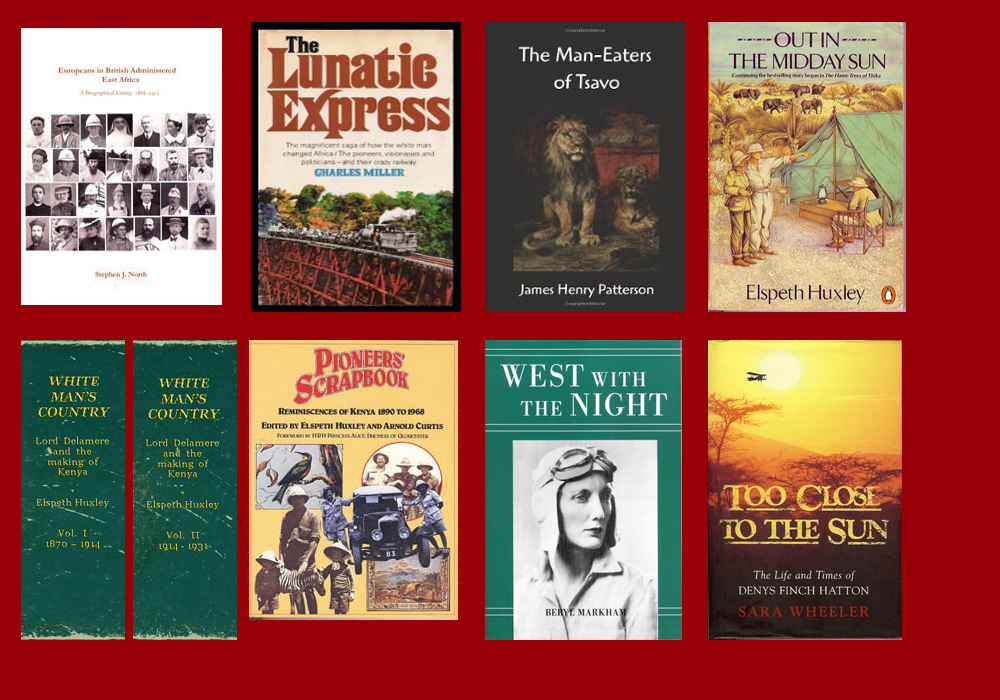
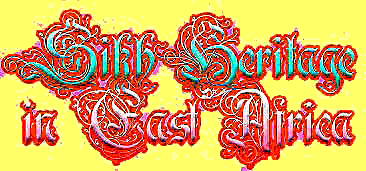
The Sikh heritage in East Africa
The Asian heritage in East Africa

Birmingham a history of the city and its people
Exploring the Faithful City
Sutton Coldfield in the Forties by John Bassett
Lost Lion of Empire by Edward Paice
The Heydays of Selly Oak Park 1896-1911
James Fox White Mischief

